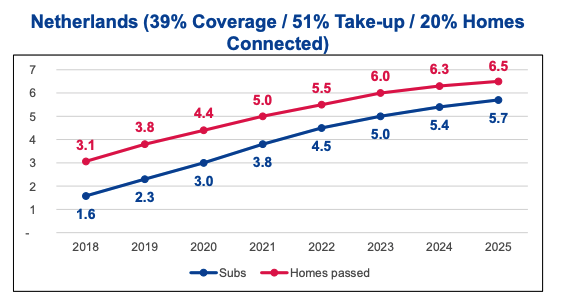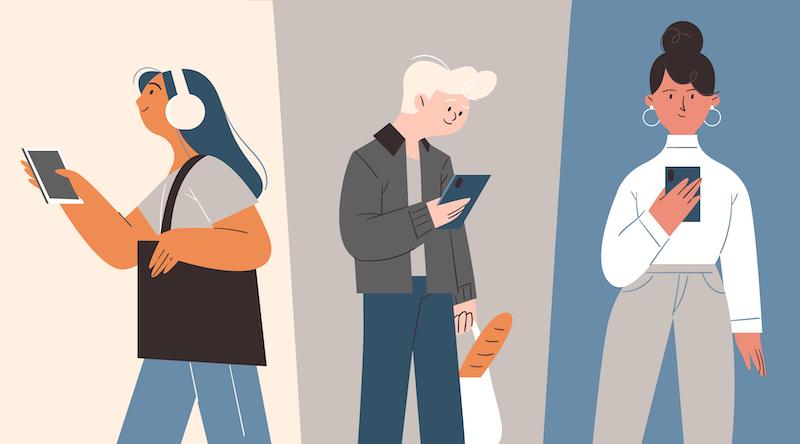
Ultimate guide for choosing internet in the Netherlands [2024]
Are you an expat, planning to re-locate to the Netherlands? Or a student who plans to study in Holland at a Dutch university? This extensive guide helps you to get connected to the internet while you stay in this beautiful country.
Choosing an internet service provider (ISP) can be tricky: there are a lot of factors to take into account, several companies with multiple internet packages to compare, and endless reviews to read about every single one.
If you’ve recently relocated to the Netherlands and happen to be in this boat, then you’re probably starting to feel a tad overwhelmed – and tempted to sign up with any of the largest ISPs in the country to just get it over and done with. We get it.
Don’t despair: getting connected to the internet doesn’t have to be unnecessarily complicated. In this extensive guide we provide you with all the information needed to make an informed choice for the internet subscription that best fits your needs during your stay here.
Contents
- About internet in the Netherlands
- Best internet provider in the Netherlands
- Things to consider when choosing a landline internet subscription in the Netherlands
- How to cancel your internet contract before it finishes
- Sources
About internet in the Netherlands
High-speed internet access is widespread in the Netherlands. The country is densely populated. Therefore, laying landlines is relatively cheap compared to other countries (which are less densely populated). This makes it easy for internet service providers to provide high speed landline internet connections to nearly every home in the country.
Most Dutch people have a landline internet connection to their homes, next to a mobile data subscription for on the go. Disruptions in service are rare. There can be some downtime due to maintenance to the network, but this tends to be in the nightly hours. So no worries: you can count on a stable internet connection when you are in NL.
Costs of internet in the Netherlands
Your monthly internet price depends on the sort of subscription and on the provider you choose. Generally, the cost of Dutch internet isn't high. For instance, the cheapest internet only subscription costs € 32,50 per month (Odido), whilst the most expensive choice costs you over € 100,- per month (also Odido). Note that these are completely different internet speeds (50 Mbps versus 8.000 Mbps). Not just the speed, but also the connection is important (DSL versus fibre).
Average internet speed in the Netherlands
Average internet speed is almost 200 Mbps1! This puts the Netherlands in the top 20 of countries in the world with the fastest internet connections.
Dutch politics recognize the importance of a fast internet connection for every citizen. Due to anti-competitive regulations, the government doesn’t have much power to actively improve the speed by laying landlines or offering services. The local ISPs have to do this. Luckily, this is going well. There are few homes with low internet speeds, and they are mostly in the rural areas of the Netherlands. KPN is expanding their fibre network to offer these people fast internet as well.
There are no data limits for downloading and uploading while using the landline. This is different from Belgium, for example, where ISPs do put data limits on landline internet connections.
Net neutrality (EU rules, effective since april 2016) bans throttling or favoring specific types of data. the Netherlands was one of the pioneers on the topic of net neutrality: in 2012 the Netherlands became the second country in the world to enforce net neutrality by law, before any European laws made this the standard in the EU area2.
Landline internet networks and providers
Networks
There are three large networks in the broadband market in the Netherlands. Formerly state owned KPN has the largest DSL network, based on telephone lines. The company is also investing a lot in fibre networks, which are still being installed in a lot of places in the Netherlands, especially in the rural areas.
The Vodafone/Ziggo corporation (in the rest of the article will be referred to as 'Ziggo') is a result of several mergers and acquisitions of other cable tv providers and has the largest (coax) cable network. There's also Odido (previously T-Mobile), who is competing with KPN fibre, and is especially active in the bigger Dutch cities.
Multiple smaller local networks and local fibre cooperations play a role only regionally. Thus: KPN, Odido and Ziggo rule the market.
Virtual providers
Part of the ISPs are virtual providers: they don’t own a network but provide services over the open KPN DSL or fibre network. In March 2020, it has been decided that Ziggo is allowed to keep their cable network closed, so (unfortunately) there is no competition on the cable network3.
Types of connections
There's three types of connections in the Netherlands:
| Connections | Pros | Cons |
| DSL | Cheap | Your maximum speed depends on your address |
| Available on most addresses | The connection is less stable than cable or fibre | |
| Easy to install | ||
| Cable | Relatively cheap | Usually a little more expensive than DSL |
| Stabile connection | No competition on a cable network: there's only 1 provider to choose | |
| Fast internet connection (depends on the speed you choose) | ||
| Fibre | Futureproof (internet speeds via fibre can be developed through the years to be even higher) | Usually the most expansive option (although more and more providers offer fibre) |
| Very high speeds, also for uploading | Fibre isn't available on every address | |
| The most stable connection |
Read more about the different connections
Most households have both a DSL connection and a cable connection. KPN and Odido have started to invest in new fibre networks all over the Netherlands, resulting in more and more places getting access to high speeds. As of 2024, over 7 million Dutch households have access to fibre internet. It is expected that by the end of 2026, almost every household in the Netherlands will have a fibre connection4.
Ziggo on the other hand prefers to invest in their existing cable network.
Even though a lot of households have a connection to fibre, not all of them are actually using these connections. It is expected however that more and more people will use a fibre subscription in the near future.
Best internet provider in the Netherlands
Wondering what the best ISP is in Holland?
Depending on reviews on our website, these internet service providers come out on top:
| ISP name | Customer satisfaction score | Our score | Average rating | Reviews |
|---|---|---|---|---|
| Ziggo | 4,4 | 8,5 | 6,5 | See the Ziggo reviews (in Dutch) |
| KPN | 4,4 | 8,5 | 6,5 | See the KPN reviews (in Dutch) |
| Odido | 4,2 | 8,0 | 6,1 | See the Odido reviews (in Dutch) |
You're probably thinking: those customer scores don't look too great. Unfortunately, most (moderately) happy customers don't tend to leave a review. Except maybe if they had a once-in-a-lifetime experience with customer service or something like that. That leaves the unhappy few.
So we advise to take these numbers with a pinch of salt. Nine out of ten times, the service simply works and won't give you any headaches.
Mobile internet
The Netherlands also ranks in the top ten of the world when it comes to mobile download speeds5. The fast 4G network makes sure you can download at high speed on your smartphone. 4G availability is over 97% 6. Coverage is excellent compared to other countries, due to the dense population: it’s easier to find a spot without tulips and mills than to visit a place where your phone loses connection.
An even faster 5G network is also available if you choose KPN, Budget Mobiel, Vodafone, Odido or Youfone network. Take note that it's not yet noticeably faster than a 4G connection. This is because the faster frequency that 5G supports is not yet in use. This will probably be in the Summer of 2024. You also need a fairly new phone that supports 5G, and is compatible with your mobile provider.
In conclusion: a 5G connection is not really necessary yet. A fast 4G connection suffices.
Providers
Three providers own a physical mobile network: Odido, KPN and Vodafone (yes, from Vodafone/Ziggo). There are numerous mobile operators that provide services over the networks of the providers mentioned before. As a user, you won’t notice if you’re a customer at a virtual provider or at a provider with its own network.
Just a few years ago, Tele2 introduced itself as a new provider with their own network. They entered the market by winning a frequency auction of the government, organized with the intent to introduce a new competitor to the market. In 2017 however, Odido announced that they acquired Tele2. So the mobile market in the Netherlands can be seen as an oligopoly.
Roam like at home (EU)
With an EU sim, you can call, text and use mobile data like in your home (EU-member) country in every other country in the European Union7. This way, you can use your mobile phone in every other EU country as you would in your home country, without incurring extra charges (so no worries about your bill when you arrive home). This applies not only to calling and texting, but also to the data bundle provided by your domestic mobile operator.
Roaming is a good option if you stay in the Netherlands for only a short period of time (and if you’re an EU resident with a SIM from an EU country). However, for longer stays it isn’t a good alternative to a landline connection, because there are a couple of ‘fair use’ caveats to these roaming rules to prevent abuse.
Your operator can monitor your roaming use over a four-month period. If you’ve a) spent more time abroad than at home, and b) used more data while roaming than at home, your operator may contact you and ask you to clarify your situation, to which you’ll be given 14 days to respond. If your roaming data consumption continues to exceed your domestic data usage, then your carrier may start applying a surcharge to your roaming consumption.
For 2024, the surcharge (excluding VAT) for data is capped at € 1,80 per GB.
Please note that Roam like at home does only apply when roaming. For calling someone abroad (in another EU or not-EU country), higher tariffs may be in place.
For more information about the Dutch mobile landscape, make sure to read our guide about mobile subscriptions in the Netherlands!
Other options
Are both connecting to a landline and to mobile internet not an option for you? These are alternative ways to access the internet:
- Wifi in public transportation:
- In NS trains and at the (large) train stations. Small train stations don’t offer a KPN hotspot. Some other train operators also don’t offer a wifi hotspot.
- Some newer busses offer a wifi hotspot.
- Most hotels, restaurants and cafes offer a wifi network for their guests. Sometimes you’ll have to ask for the wifi password to get access.
- Internet cafes (not very common)
- Public computers at libraries
Found an open wifi network? Please note that it’s illegal to use someone’s wifi network without permission. This is called ‘computervredebreuk’ and is punishable by law8. However, it is difficult to discover illegal use of unsecured wifi networks & to enforce this law.
Things to consider when choosing a landline internet subscription in the Netherlands
Contractual obligations (Important!)
Are you sure you will stay in the Netherlands (& keep your subscription) for more than a year? Then you might skip reading these tips.
Do you intend to stay in the Netherlands for less than a year? Or just not sure if you will stay for a full year? Then please read carefully about some caveats you have to watch out for when choosing a subscription.
Duch internet subscriptions are usually for 1 year, sometimes for 2 years, so pay close attention when you close the deal. Only KPN offers monthly terminable contracts.
If you end your subscription before the contract term ends you may have to pay a penalty fee. When it comes to subscriptions, Dutch law is generally in favor of the consumers. Companies are required by law (the Dutch “Wet van Dam”) to let you end your subscription with a notice period of one month.
By the way, the same goes for all kinds of subscriptions, like subscriptions to magazines & newspapers, TV subscriptions, fitness subscriptions, etc.
If you can show your provider that you're emigrating, you can cancel your contract without extra costs.
Read more about the terms of cancelling your contract prematurely.
Different rules for for-business subscriptions
For companies, other terms apply. If you sign a subscription as a company, you might get a notice period of three months to a year. This makes it beneficial for subscription companies to allure customers to sign a for-business subscription by stating this subscription might save the customer money. It might be the case that this subscription is a bit cheaper, but it will also bind you to the for-business terms & conditions (including terms like that longer 3 months notice period you likely forgot about when you are about to cancel the contract 2 months in advance).
So please watch out to not register the subscription on your company name if there’s no need to.
Do you need a Dutch bank account when ordering an internet subscription?
If you want to order an internet subscription, you usually need a Dutch bank account. Most providers use iDeal (a Dutch online payment method) for a one-time payment of € 0,01. This way, they can see if your bank account is actually real. Unfortunately, international bank accounts don't work with iDeal (yet9). Because of this, you will need a Dutch bank account.
We asked various providers how expats can order an internet subscription without having to use a Dutch bank account. These providers offer a solution:
- Ziggo
- Odido
- KPN
- Solcon
With these providers, having an IBAN (International Bank account) suffices.
Do you have other experiences? Please let us know in the comment section below.
Read more about ordering Dutch subscriptions without having a Dutch bank account.
Speed, intensity of use
What do you want from your broadband connection? Don’t like to wait? Or just want something for your basic internet browsing needs?
Low standard/demands, limited use
Situation: does one or more apply to your situation?
- 1-2 person household;
- No need for frequent Skype contact;
- No problem if it takes a while for Windows updates or app updates to be downloaded;
- Fast internet connection available at work;
- No online gaming;
- Streaming movies occasionally, but seldom/never with multiple persons at the same time;
- No watching TV/sport via the internet connection;
- Low price is important.
If your expectations/standard for your internet connection are low, a simple internet connection will do for you. Don’t bother paying too much for speed you won’t use: choose a simple DSL subscription. 30-40 euro a month, 20-40 Mbps.
Don’t bother choosing a cable or fibre connection. They’re too expensive to justify choosing them.
Higher demands/standard, more intensive use
Situation: does one or more statements apply to your situation?
- Household with 1-3 persons;
- Household with young kids;
- Watch Netflix, listen to Spotify;
- Share photos and videos online;
- Skype with family.
Then look for an internet connection with at least 50 Mbps down, 8 Mbps up. Both cable, DSL or fibre will do.
High standards/demands, intensive use
Situation: does one or more apply to your situation?
- Teenage kids in your household (who’d like to watch Netflix, watch their favorite YouTubers & upload TikToks all day long);
- Lots of connected devices at the same time (phones, tablets, laptops, smart devices like video cameras, doorbells, etc.);
- You work at home, for example as a video editor, freelance photographer, vlogger, and you would like to share photos and videos fast;
- Smooth online gaming experience, without lag troubling your chances to win the game;
- Backup files online instantly;
- Online with multiple users at the same time, streaming Netflix films, watching YouTube, play online games and have an uninterrupted Skype conversation at the same time.
Are sending large files, uploading videos to YouTube, uploading large sets of photos to your family in your home country something you do on a regular basis? Don’t want to wait? Or don’t want to hear people (your teenage kids?) complaining about the internet connection? Choose a fibre connection if that is available, and if not, a cable connection from 100 Mbps, preferably faster if that's possible.
Don’t bother looking at DSL connections, only a small chance there’s a high speed DSL connection available at your address.
Internet speed & the hardware in your home
Please note that internet speed does not only depend on your broadband subscription. If you connect multiple devices, you might need a better router hooked up on the modem that the ISP provides. If you connect your devices over wifi, you might need a more powerful router and/or a range extender for better connectivity on the 2nd (or 3rd) floor (and in spaces that are further away from the main wifi access-point).
The recommendations mentioned above depend on the availability of different connections at your address. Please read on to learn more about the different types of connections available in the Netherlands.
Types of connections
To get access to the internet in your home, you need your home to connect to a physical network that is connected to the world wide web. In the Netherlands we basically have three types of connections for landline broadband internet:
- DSL
- Cable
- Fibre
Each connection type has its own advantages & disadvantages, but most of the times these are no deal breakers. Most important to keep in mind:
DSL or Digital Subscriber Line
A step up from the dial-up connections of yesterday, DSL allows for both phone and internet usage at the same time. A DSL connection uses your local phone line to deliver internet access at speeds as high as 200 Mbps. If the successor of DSL (VDSL) is available at your home, you can get acceptable speeds with DSL. DSL broadband connections tend to be among the cheapest internet connections.
DSL has a high coverage: Dutch homes without a DSL connection are scarce. DSL’s main draw is that it is widely available and easily accessible. Keep in mind, however, that unlike cable and fibre-optic connectivity, the actual download speeds for DSL can be slower than the speed advertised by the ISP. Generally, the further you are from your neighbourhood’s network access point, the slower the internet speed.
You can easily check the maximum speed via DSL on your address with our postcode check:
Cable internet
Cable is the most widespread type of connection (almost every Dutch home has a cable connection). Ziggo basically has a monopoly on the Dutch cable market, there are few areas that have a different cable provider.
Cable subscriptions in the Netherlands tend to offer higher speeds (speeds average between 30 Mbps and 1.000 Mbps) than DSL & can often get you enough speed for a large household with multiple people watching online movies at the same time.
In general upload speed is about 10% of the download speed. So if you’d like to have a higher upload speed via a cable connection, get a subscription with a higher download speed.
While cable connectivity is faster and more reliable, its main drawback is that it is more expensive than DSL and may not always be available for you. Even if there is availability, chances are that your choices are restricted to a single provider.
Fibre internet
If the fastest speeds possible are a high priority for you, then a fibre-optic connection is the way to go. Tiny glass fibres send and receive data at speeds ranging from 50 Mbps to 1.000 or even 8.000 Mbps, making fibre-optic connections the fastest internet solution out there. This is especially significant when it comes to upload speeds: fibre connections can upload data up to five times faster than both DSL and cable networks.
But, why does upload speed matter? A good upload speed is essential for sending large files (like backups to a cloud backup service or large videos to YouTube) or while hosting videoconferences online.
So why is fibre internet not the obvious choice for all users? For the simple reason that it requires the presence of fibre-optic cables in your area. Therefore, this option is ruled out if your area doesn’t support the installation of a fibre-optic connection. Chances are that it’s not possible for you to get a fibre internet subscription.
Also consider that a fibre subscription is often a bit more expensive than DSL.
Price
Do you want to make every penny count?
Odido, Youfone, Online & Budget Alles-in-1 are amongst the cheapest internet providers in the Netherlands (you can get a subscription with them for as low as € 32,50 a month).
Choosing fiber? A fiber speed is enough for your Netflix watching needs, even with a budget provider. The thing you need to pay attention to (at least, if you think that is important) is the customer service. This is usually the thing that the cheaper providers save money on. That can mean that they aren't available by phone, or they aren't as technically skilled as with other ISPs.
Dutch insiders tip: get started really fast
In a hurry to get your internet connection activated within days? Choose an internet subscription from Ziggo (or one of the other cable internet providers like Delta in the Zeeland province). Here’s why: in contrast to fibre and DSL connections, the signal on the cable is always on/active. So the moment you receive your modem from the cable ISP, you can start using the connection. Most of the time, Ziggo provides you with the modem within days after you signed your cable subscription at the Ziggo website.
Combining subscriptions to get a discount
Want to close your utility contracts like a Dutchman? Then you have to go the extra mile to get extra discount: combine several utility subscriptions to get extra benefits and discounts. If you speak Dutch: not a big problem. But if Dutch isn’t your native language, then this might be an extra hassle.
The options are as follows: combine two, three or even four of these subscriptions to get extra benefits:
- TV subscription
- Landline phone connection
- Landline internet subscription
- Mobile phone subscription
- Extra mobile phone subscriptions for family members
The benefits are subject to change, but expect to see benefits like:
- Up to 5 euro discount per month (on more expensive plans)
- Double data & minutes on your mobile phone plan
- Free calls between family members
- Extra TV channels
Also: some people see it as a benefit to have just one supplier for all their utility subscriptions needs.
Use our 'Additional bundle discount' filter on our Compare Broadband page to find out which providers offer this.
Other factors to consider
Does the customer service speak English?
Most of of them do.
Focussing too much on this can make your subscription more expensive. It’s always handy to ask for help from someone who speaks Dutch. The people of Prijsvergelijken are also willing to help you find the right contract.
Service you can count on
As a foreigner, it’s difficult enough deciding on which ISP to sign up with. It goes without saying that if you’re ever in need of technical assistance, it’ll make a huge difference if your ISPs customer service is easy to deal with.
Your experience may vary, of course; there’s no company on Earth that can reliably guarantee customer satisfaction for every interaction.
However, according to Consumentenbond, a consumer protection non-profit organisation, a survey of over 10,000 consumers found Freedom Internet to have the best customer service in the last quarter of 202310.
Ziggo also gets a honourable mention for having been ranked the best ISP for the last eleven(!) consecutive years by Tweakers.net, the most popular tech news and reviews site in the country.
If you’re technologically challenged or simply want the reassurance of helpful assistance when it’s needed, these are good options to consider.
Wifi hotspots
Ziggo, KPN and DELTA offers wifi hotspots.
Stuff you are safe to ignore
Stability of the internet connection
Internet connections are stable among all ISPs. Outages in service are rare.
Small print in your contract
The law against malicious companies protects Dutch consumers very well.
How to cancel your internet contract before it finishes
It happens to the best of us: you thought you’d be in the Netherlands for at least a year, only to regretfully realize at some point that your stay is going to be shorter than intended after all. Or perhaps you signed up for a subscription during a promotional period, which came with certain conditions, such as longer contract duration than you realized.
Unfortunately, it’s too late: you’re already saddled with a contract with your ISP, and breaking that contract earlier than you signed up for comes at a penalty. Usually, if you want to end your contract before it expires, you’ll have to make an upfront payment for its remainder. For example, if your contract is for a year and you want to terminate it after seven months, you’ll need to pay for the remaining five months immediately.
The exception to this rule, however, is if you’re permanently relocating to a country where your ISP can’t co-host your package.
We reached out to the major providers in the Netherlands - KPN, Ziggo, and Odido - and found that in case of this specific situation, all providers will cancel your contract for free.
Here’s how to go about canceling your contract.
- What documents will you need to provide to your ISP?
Depending on your ISP, you may need to provide the following:
- An email stating your intent to officially terminate the contract earlier than agreed upon, and a brief explanation as to why
- Proof that you are leaving the country permanently, such as a notice from your local city council that you have deregistered your address in Holland
- Proof that you are moving to a country where your ISP is unable to deliver service, such as a job contract in the country you’re moving to
- Your contact details, including your full name and the address and postcode at which your contract is registered to
- Your customer service number
- What’s the procedure for ending your contract before the term is over?
The following process that we confirmed with KPN’s customer care department is an example of the steps you need to follow.
Step 1: Go to your local gemeente or stadhuis (town or city hall) to officially deregister your address in Holland and declare that you’re leaving the country permanently. Get the confirmation in hard copy.
Step 2: Obtain an official document - such as a job contract or an admission letter from a university - showing that you’re moving to a country where KPN is unable to provide service.
Step 3: Write an email to [email protected], stating your intent to end your contract early, and why. Attach digital copies of #1 and #2, and include your KPN customer number, your address, and contact details.
Step 4: After receiving your email, KPN customer service will call you to verify that the details are accurate, and thereafter, cancel your contract for free.
Apart from a few minor differences, this process is similar for all the ISPs that we contacted. We recommend checking with your provider to clarify whether you’re eligible to cancel your contract for free, and what the process will be for yourself.
Sources
1. http://www.speedtest.net/global-index
2. https://en.wikipedia.org/wiki/Net_neutrality_in_the_European_Union
5. https://www.speedtest.net/global-index
6. https://www.opensignal.com/reports/2022/03/netherlands/mobile-network-experience
7. https://europa.eu/youreurope/citizens/consumers/internet-telecoms/mobile-roaming-costs/index_en.htm
8. http://wetten.overheid.nl/BWBR0019934/2007-09-01
9. https://nos.nl/artikel/2472774-betaaldienst-ideal-wordt-overgenomen-naam-verandert-over-enkele-jaren
10. https://www.consumentenbond.nl/internet/beste (Dutch)







